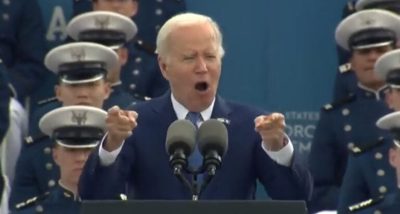The Art of Diplomacy: Biden Blows Up Blinken’s Mission to China

All Global Research articles can be read in 51 languages by activating the Translate Website button below the author’s name.
To receive Global Research’s Daily Newsletter (selected articles), click here.
Click the share button above to email/forward this article to your friends and colleagues. Follow us on Instagram and Twitter and subscribe to our Telegram Channel. Feel free to repost and share widely Global Research articles.
***
Dementia Joe does it again. Less than 24 hours after Secretary of State Blinken genuflected before the Chinese, assuring them that the United States really, really, really is sincere in supporting the One China policy and eschews calling for Taiwan’s independence, Biden opened his yap and called Xi Jinping a dictator. While this garnered applause from the American financial donors, it destroyed Blinken’s credibility with the Chinese and confirmed their worst suspicions about U.S. intentions.
When it comes to the art of diplomacy, saying what you really think or believe is not an acceptable practice. While many Americans believe that China’s Xi is a dictator and are wondering what the fuss is surrounding Biden’s intemperate, off-the-cuff remark, saying this in public stiffens Chinese doubts about U.S. intentions and makes it virtually impossible for the United States to have any kind of productive working relationship with China going forward.
Just a day after Blinken’s weekend visit to China, U.S. President Joe Biden called Chinese President Xi Jinping in a move that has infuriated Beijing and left U.S. officials perplexed. Biden said the comments in front of donors at a California event.
Chinese Foreign Ministry Spokesperson Mao Ning called the comments a “provocation” and “irresponsible.” U.S. officials have privately sought to inform the Chinese that this doesn’t represent a shift in tone or mood since the Blinken visit.
See this.
I suspect there were some of Xi Jinping’s foreign policy advisors who warned that receiving Blinken was a mistake and that the U.S. could not be trusted to live up to its promises. Guess what? They are serving up a big load of crow to those in the Chinese Government who advocated for the meeting with Blinken. Those advocates have lost face, big time.
American political leaders, including those in the Biden Administration and Republicans, need to make a choice — cool the bombastic, threatening rhetorical comments or prepare for deteriorating relations with China that will inflict enormous damage on the U.S. economy for the foreseeable future. There is no middle ground.
Many of the so-called American China mavens advocate more deterrence (i.e., more cowbell). CSIS published the results of a China/America war game in January:
CSIS developed a wargame for a Chinese amphibious invasion of Taiwan and ran it 24 times. In most scenarios, the United States/Taiwan/Japan defeated a conventional amphibious invasion by China and maintained an autonomous Taiwan. However, this defense came at high cost. The United States and its allies lost dozens of ships, hundreds of aircraft, and tens of thousands of service members. Taiwan saw its economy devastated. Further, the high losses damaged the U.S. global position for many years. China also lost heavily, and failure to occupy Taiwan might destabilize Chinese Communist Party rule. Victory is therefore not enough. The United States needs to strengthen deterrence immediately.
The proposal to “strengthen U.S. deterrence”, which is academic jargon for building up U.S. military capability in the Pacific, is a non-starter. The U.S. already is bogged down in Ukraine, has depleted critical weapon supplies and lacks the industrial capability to rapidly replace weapons and build tanks, combat aircraft and ships required, in theory at least, to deter China.
China is likely to become more firm in defining its territorial waters and air space and will make normal commerce with Taiwan more difficult for the United States, but it sees war as a last resort. China has a number of other cards to play. The most important of these is the January 13, 2024 election in Taiwan where the party that wants a closer relationship with the mainland appears to have a chance to win the Presidency. If the Kuomintang prevails then the door is open for a peaceful reconciliation between the mainland and Taiwan. This will be a punch to the gut for the United States and will upend Western plans to foment a rift in the Communist Party.
You can be sure that Western and Chinese intelligence agencies will be actively interfering in this election to secure their respective interests. Hypocrisy alert — don’t be surprised that many of the American politicians who decried alleged Russian interference in the 2016 U.S. Presidential election will be enthusiastic supporters of the U.S. Government and its subsidiary agencies meddling aggressively in the Taiwan election. We can do it to you but don’t do it to us.
If you’re holding your breath in hopes of a peaceful resolution to this conflict you will pass out from lack of oxygen. I fear that the American political dynamics are so toxic and twisted that we are setting ourselves up for an inevitable war with China. I also worry that the Chinese leaders have reached this same conclusion and will ramp up their efforts to work more closely with Russia in building a new world order that will weaken American influence and will bolster its naval, air and hypersonic missile capabilities.
*
Note to readers: Please click the share button above. Follow us on Instagram and Twitter and subscribe to our Telegram Channel. Feel free to repost and share widely Global Research articles.
Featured image is from Gateway Pundit

